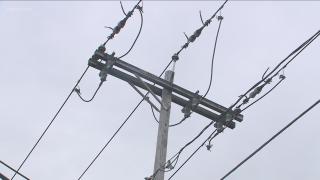Power and gas outages

Power outages may become more frequent with increased storm intensities due to climate change. Stay informed on outages by using the Central Hudson Interactive Outage Map. In the event of a gas-related emergency, call 911 to contact the local fire department. For information regarding electric and natural gas safety, visit cenhud.com/Safety.
In the event of an emergency, Central Hudson will distribute dry ice and bottled water to customers in need.
Customers can stay informed of storm and restoration conditions in the following ways:
- By text message: Customers should enroll in Central Hudson’s Texting Program to use text messaging to report their power condition and to obtain repair status. To enroll, visit CentralHudson.com/Alerts or text REG to 236483
- On the Web: Visit CentralHudson.com/Storms to report outages and obtain restoration updates
- Via smartphones: Updated free Central Hudson mobile applications are available for Android and Apple devices by logging onto cenhud.com/mobileapp.
- Through social media: “Like” Central Hudson on Facebook (Facebook.com/CentralHudson) and “Follow” on Twitter (Twitter.com/CentralHudson)
- By phone: Call the Central Hudson PowerLine at (845) 452-2700 or 1-800-527-2714, and please use the automated system to report or monitor your power condition.
- If a member of your household needs electricity to operate life-sustaining equipment, please contact customer service at (845) 452-2700.
Power Line Safety
Downed power lines can be extremely dangerous and can cause severe injury or death. Here is some detailed information and resources on how to stay safe when there are downed power lines after a storm:
- Stay away from downed power lines: Always assume that any downed power line is energized and dangerous. Stay at least 10 feet away from the downed line and anything that it may be touching.
- Avoid contact with anything in contact with the downed line: If a power line has fallen on a car, fence, or tree, avoid touching these objects as they may be energized.
- Never attempt to move a downed power line: Only trained professionals should handle downed power lines. If you see a downed power line, call your local power company or emergency services immediately.
- If you're in a vehicle that encounters a downed power line: Stay inside the vehicle and wait for help to arrive. If you must exit the vehicle, jump out with both feet together, landing on the ground without touching the vehicle and the ground at the same time. Shuffle away from the vehicle, always keeping your feet close together and on the ground.
- Report downed power lines: If you see a downed power line, report it to your local power company or emergency services immediately.
Additional Resources
- Central Hudson – Electrical Safety
- Electrical Safety Foundation International - Downed Power Lines
- Centers for Disease Control and Prevention - Power Outages
- Ready.gov – Power Outages
Generator Safety
In the event of an electric failure, generators are typically used as a source of secondary power. Unfortunately, this emergency equipment can present serious health and safety concerns. The following information is sourced from the Occupational Safety and Health Administration (OSHA), Red Cross, and the Federal Emergency Management Agency (FEMA). The primary hazards that arise when using a generator include:
Carbon Monoxide (CO) Poisoning
- Install CO alarms in central locations with your home. Test batteries frequently and replace when necessary. Ensure alarms are located on every level and in close vicinity to sleeping areas to ensure proper warning of accumulating carbon monoxide.
- Never use a generator inside a closed space, including but not limited to, homes, garages, basements, crawlspaces, or any partially enclosed area.
- Ensure devices are outdoors and are kept away from doors, windows, and vents that could allow carbon monoxide to circulate indoors.
- CO cannot be seen or smelled, leading to incapacitation or death. Do not attempt to use fans, open doors, or windows to allow for air flow. Rather, if you begin to feel sick, dizzy, or weak – get to fresh air immediately and seek medical attention. Do not re-enter the area until it is determined to be safe by trained and properly equipped personnel.
Fire
- Generators increase in temperature while running and may remain hot even after they are stopped. Ensure proper cool off time before refueling, relocating the generator or placing objects nearby.
- Generator fuels (gasoline, kerosene, etc.) are flammable and will ignite when spilled on a hot engine part. All fuels should be stored in containers with proper designs, ventilation, and labeling for contents. Fuels should NOT be stored in the home.
Electrocution
- Always use heavy-duty extension cords when connecting a generator to other appliances.
- An increase in voltage or a surge to outside power lines can occur when hooking your generator directly into your home power supply. This action could lead to potential injuries or electrocution of utility linemen but may also bypass circuit protection devices, resulting in a surge electricity leading to major injury or death.
Additional Resources
- Generator safety video (Includes American Sign Language (ASL) translation)
- How to operate a generator
- CDC carbon monoxide video or call 800-232-4636
Car-Charging Stations
In the event of an emergency, visit NYSERDA’s Electric Vehicle Station Locator to find nearby electric charging station locations. The U.S. Department of Energy’s (DOE) Alternative Fuels Data Center (AFDC) provides up-to-date information on alternative fueling station locations.
Download the National Renewable Energy Laboratory’s mobile application available for Android and Apple devices.
